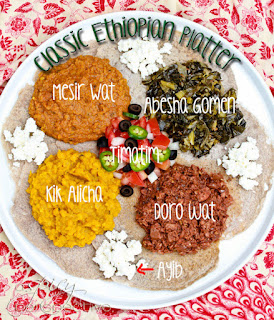Ethiopia (and especially the Ethiopian Orthodox Church) still use the old Julian calendar, so they celebrate Christmas on January 7th, not December 25th! The Christmas celebration in the Ethiopian Orthodox Church is called Ganna. Most people go to Church on Christmas day.
Many people fast (don't eat anything) on Christmas Eve (January 6th). At dawn on the morning of Ganna, people get dressed in white. Most people wear a traditional garment called a shamma. It's a thin white cotton piece of cloth with brightly colored stripes across the ends. It's worn like a toga. If you live in a big town or city you might wear 'western' clothes.
The early Ganna mass starts at 4.00am!
The Ethiopian capital city is Addis Ababa. It's a modern city. Most people who live outside big cities live in round house made of mud-plastered walls which have thatched cone-shaped roofs. Sometimes houses in the country are rectangular and made of stone.
The design of Ethiopian Church is similar to the houses. In the country, they are often very old and have been carved out of rock. In cities, modern churches are built in three circles, each within the others.
The choir sings from the outer circle. Everyone who goes to church for the Ganna celebrations is given a candle. The people walk around the church three times in a solemn procession, holding the candles. They then go to the second circle to stand during the service. The men and boys are separated from the women and girls. The center circle is the most important and holy place in the church and is where the priest serves the Holy Communion or mass.
It's also a tradition that one of the Wise Men who visited Jesus came from Ethiopia.
Around the time of Ganna, the men and boys play a game that is also called ganna. It's played with a curved stick and a round wooden ball, a bit like hockey.
Ethiopian men also play a sport called yeferas guks. It's played on horseback and the men throw ceremonial lances at each other (sounds rather dangerous!).
People don't give and receive present during Ganna. Sometimes children might be given a small gift of some clothes from their family members. It's more a time for going to church, eating lots and playing games!
In Ethiopia, in the Amharic language, Father Christmas or Santa Claus is called 'Yágena Abãt' which means 'Christmas Father'.
Traditional Christmas foods in Ethiopia include 'wat' which is a thick and spicy stew that contains meat, vegetables and sometimes eggs (sounds yummy!). Wat is eaten on a 'plate of injera' - a flat bread. Pieces of the injera are used as an edible spoon to scoop up the wat.
For the Doro Wat:
- 3 pounds boneless chicken, breasts and thighs, cut into 1 inch cubes
- 2 large onions, chopped
- 4 cloves garlic, minced
- 2 sticks (1 cup) butter
- 1 cup red wine
- 2 cups water
- 2 teaspoons salt
- 1 teaspoon ground cardamom
- 2 tablespoons garam masala
- 1/3 cup hot smoked paprika
- 1 tablespoon crushed red pepper
- 2 teaspoons fenugreek seeds
- 1 tablespoon dried thyme
- 3 tablespoons tomato paste
- 1 tablespoon sugar
- 1 lime, juiced
Place all the ingredients, minus the lime juice, in a slow cooker and cover. Cook for 4-6 hours--depending on your slow cooker settings--until the chicken is tender. Then mash the chicken to shreds with a potato masher (or the bottom of a ladle.) Stir in the lime juice and keep warm.
- 3 cups all purpose flour
- 1 cup buckwheat flour
- 2 tablespoons baking soda
- 1 teaspoon salt
- 4 cups club soda
- 1 cup white or rice vinegar
- Oil for pan
In a large bowl, mix both flours, salt and baking soda together. Whisk in the club soda until smooth. Then add the vinegar and whisk. Heat a large skillet over medium heat. Pour oil on a paper towel and wipe the skillet with the oiled paper towel.
Using a scoop, pour batter into the skillet creating a 6 inch circle. Carefully swirl the pan around to thin out the batter until it measures 8-9 inches across.
Cook for 1 minute, then using a large spatula, flip the Injera over and cook another minute. Remove from the skillet and stack on a plate. Repeat with remaining batter. The Injera will seem slightly crisp in the pan, but will soften immediately when placed on the plate.
Once finished cooking the Injera. Cut the circles in half with a pizza cutter, roll into tubes and stack. Keep warm until ready to serve. Serve the Doro Wat and Injera together, tearing piece of Injera and using it to pick up the Doro Wat.








No comments:
Post a Comment